YMC-Triart Series
YMC-Triart Series are organic/inorganic hybrid silica based columns that emphasize versatility. The main features are superior durability, good peak shape for all kinds of compounds, and reproducibility. With the same selectivity across different particle sizes, smooth method transfer between UHPLC and HPLC can be performed.
Moreover, alternative bonded phases such as C8 and HILIC supplement the performance of C18, allowing separations that C18 cannot achieve. For separation of proteins including antibodies, YMC-Triart Bio C4 with wide pore is effective.
YMC-Triart Prep, preparative packing materials with great chemical stability are also available.
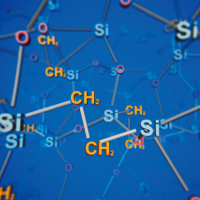
Columns
| Separation mode |
USP Class No. |
Particle size (μm) |
Pore size (Å) |
Carbon content (%)* |
Usable pH range |
100% aqueous compatibility |
|
|---|---|---|---|---|---|---|---|
| Triart C18 | Reversed-phase | L1 | 1.9 3 5 |
120 | 20 | 1 – 12 | ○ |
| Triart C18 ExRS | L1 | 80 | 25 | × | |||
| Triart C8 | L7 | 120 | 17 | × | |||
| Triart Phenyl | L11 | 17 | 1 – 10 | ○ | |||
| Triart PFP | L43 | 15 | 1 – 8 | ○ | |||
| Triart Bio C18 | L1 | 300 | – | 1 – 12 | ○ | ||
| Triart Bio C4 | L26 | – | 1 – 10 | ○ | |||
| Triart Diol-HILIC | HILIC | L20 | 120 | – | 2 – 10 | – | |
| Triart SIL | Normal-phase HILIC |
L3 | 5 | 120 | – | 2 – 8 | – |
*Containing carbon content for hybrid silica base material.
Packing materials
| Product | Particle size (µm) |
Pore size (Å) |
Carbon content (%) |
Usable pH range |
|---|---|---|---|---|
| Triart SIL | 3, 5 | 120 | – | – |
| Triart C18 | 20 | 1-12 | ||
| Triart C8 | 17 | |||
| Triart Prep SIL | 7, 10, 15, 20 | 120 | – | – |
| Triart Prep C18-S | 20 | 2-10 | ||
| Triart Prep C8-S | 10, 15, 20 | 17 | ||
| Triart Prep Bio200 C8 | 10 | 200 | 14 |
-High throughput by shortening analysis time under high flow rate condition
With innovative surface modification on organic hybrid silica, YMC-Triart columns show great chemical durability and can be used over a wide pH range. Even at high-pH or high-temperature conditions, the lifetimes of YMC-Triart C18 and C8 are more than 10 times greater than those of conventional C18 columns and a few times greater than those of commercially available high-alkaline-resistant C18 columns.
Durability at a high pH. pH 11.5, 40ºC
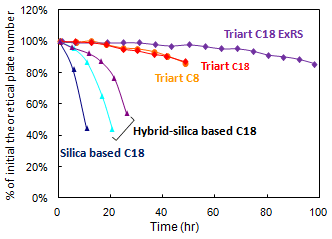
| Column | 5 µm, 150 X 4.6 mmI.D. |
|---|---|
| Eluent | 50 mM K2HPO4-K3PO4 (pH 11.5)/methanol (90/10) |
| Flow rate | 1.0 mL/min |
| Temperature | 40ºC |
| Sample | benzyl alcohol |
Durability at a low pH at a high temperature. pH 1, 70ºC
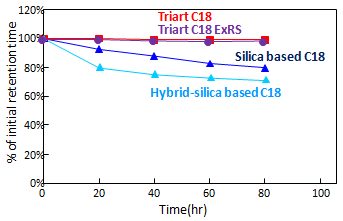
Test condition
The columns are kept in acetonitrile/water/TFA (10/90/1, pH 1) at 70ºC, and tested for performance every 20 hours under the condition of column inspection below.
| Column inspection | |
|---|---|
| Column | 5 µm, 50 X 2.0 mmI.D. |
| Eluent | acetonitrile/water (60/40) |
| Flow rate | 0.2 mL/min |
| Temperature | 37ºC |
| Sample | butyl benzoate |
-Great peak shapes without adsorption/peak tailing
The peak tailing or fronting of ionic compounds is often caused by adsorption to residual silanol groups and/or surface impurities resulting from the base material or manufacturing processes.
YMC-Triart, based on a hybrid silica material with low metal impurities and rigorously endcapped, provides symmetrical peak shapes for all types of compounds.
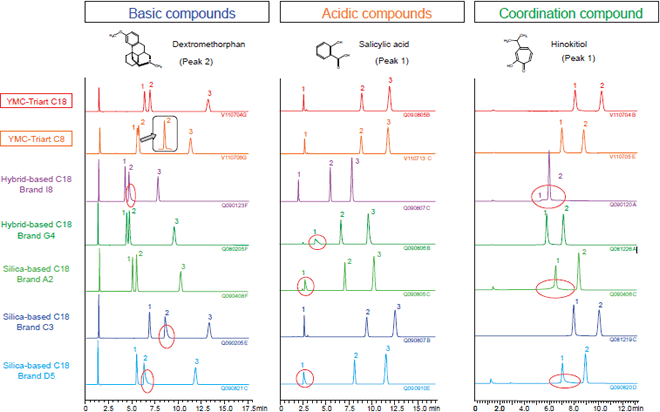
Basic compounds
| Eluent | 20 mM KH2PO4-K2HPO4 (pH 6.9) /acetonitrile (65/35) |
|---|---|
| Detection | UV at 235 nm |
| Sample | 1. Chlorpheniramine 2. Dextromethorphan 3. Propyl paraben (I.S.) |
Coordination compounds
| Eluent | acetonitrile/0.1% H3PO4 (40/60) |
|---|---|
| Detection | UV at 254 nm |
| Sample | 1. Hinokitiol 2. Methyl benzoate (I.S.) |
Acidic compounds
| Eluent | 10 mM CH3COOH-CH3COONH4 (pH 4.2) /acetonitrile (75/25) |
|---|---|
| Detection | UV at 254 nm |
| Sample | 1. Salicylic acid 2. Methyl paraben (I.S.) 3. Cinnamic acid |
| Column | 150 X 3.0 mmI.D. or 150 X 4.6 mmI.D. |
|---|---|
| Flow rate | 0.425 mL/min for 3.0 mmI.D., 1.0 mL/min for 4.6 mmI.D. |
| Temperature | 40ºC |
-Identical selectivity and excellent peak shapes across various particle sizes
YMC-Triart columns have identical selectivity and excellent peak shapes for basic (ionic) compounds across all particle sizes, including 1.9 μm. This allows predictable scale-up from UHPLC to conventional HPLC and even to semi-preparative LC, and vice versa. In contrast, commercially available C18 columns often show some differences in selectivity, retention, and peak shape between different particle sizes.
Basic compounds
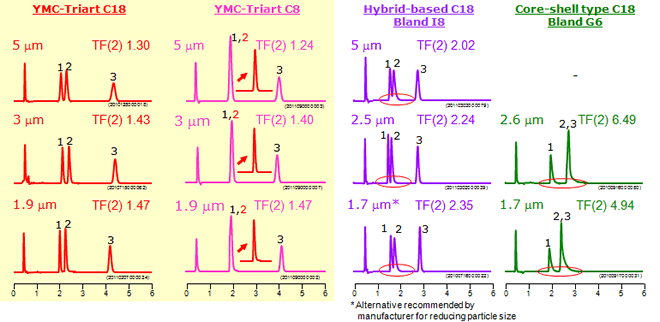
1.Chlorpheniramine
2.Dextromethorphan
3.Propyl paraben(I.S.)
| Column | 50 X 2.0 mmI.D. or 2.1 mmI.D. |
|---|---|
| Eluent | 20 mM KH2PO4-K2HPO4 (pH 6.9)/acetonitrile (65/35) |
| Flow rate | 0.2 mL/min |
| Temperature | 40℃ |
| Detection | UV at 235 nm |
-Comparison of separation selectivity among YMC-Triart columns
A mixture that consists of compounds with various characteristics is analyzed with reversed-phase Triart columns. In addition to hydrophobic interactions, secondary interactions such as π–π interactions and polar interactions differ from column to column. These parameters have a great impact on the retention capacity (k′) and separation factor (α). By utilizing the differences in the separation characteristics, a wide range of compounds can be well separated with Triart columns.
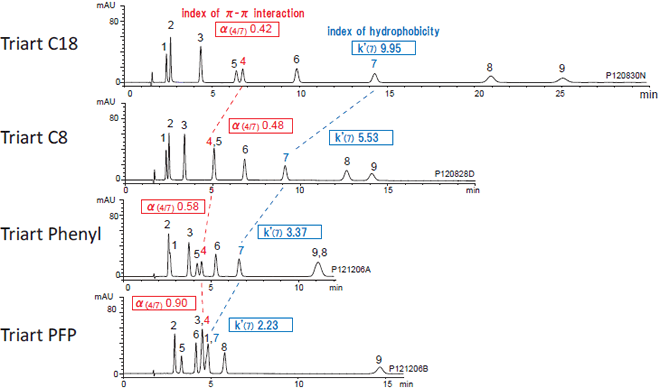
1.Amitriptyline
2.8-Quinolinol
3.Testosterone
4.Naphthalene
5.Ibuprofen
6.Propylbenzene
7.n-Butylbenzene
8.o-Terphenyl
9.Triphenylene
| Column | 5 µm, 150 X 3.0 mmI.D. |
|---|---|
| Eluent | 20 mM KH2PO4-H3PO4 (pH 3.1)/methanol (25/75) |
| Flow rate | 0.425 mL/min |
| Temperature | 40℃ |
| Detection | UV at 265 nm |
| Injection | 4 µL |
YMC-Triart series 1.9 µm columns based on novel, multi-layered, organic/inorganic hybrid silica particles are designed for UHPLC. The outstanding mechanical strength of Triart series 1.9 µm makes it ideal for use at higher pressures typical of UHPLC.
-Suitable for ultra-fast separation
YMC-Triart series 1.9 µm offers high resolution with short length column. Since its efficiency does not decrease even if the flow rate increases, it enables ultra high throughput analysis.
Ultra-fast separation of drugs
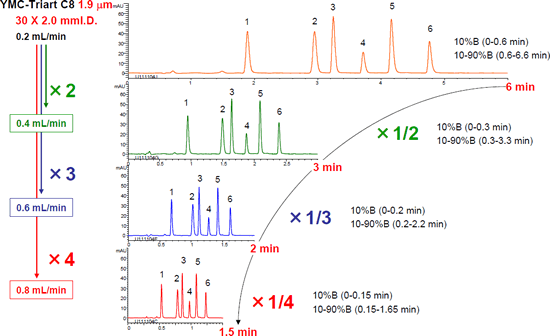
1. Hydrochlorothiazide
2. Valsartan
3. Losartan potassium
4. Amlodipine besilate
5. Atorvastatin calcium hydrate
6. Candesartan cilexetil
| Eluent | A) 10 mM CH3COONH4-CH3COOH (pH 5.5) B) acetonitrile |
|---|---|
| Detection | UV at 254 nm |
| Temperature | 30℃ |
| Injection | 2 µL |
-Useful for high resolution analysis
YMC-Triart series 1.9 µm has superior column efficiency. It is suitable for multi-component separation such as peptide mapping that requires high resolution.
Peptide mapping
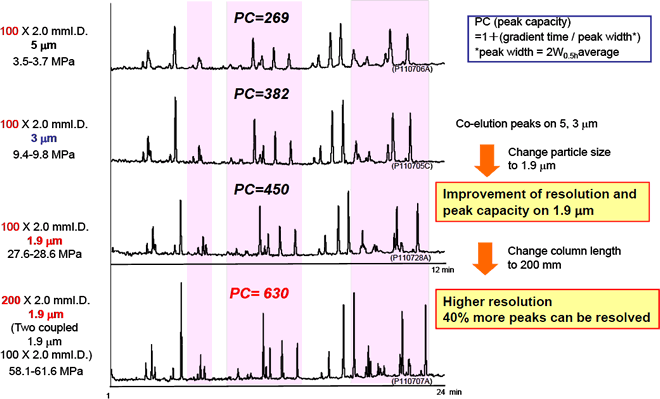
| Column | YMC-Triart C18 |
|---|---|
| Eluent | A) water/TFA (100/0.1) B) acetonitrile/TFA (100/0.08) 5-40%B (0-15 min) for a single column 5-40%B (0-30 min) for two coupled columns |
| Flow rate | 0.4 mL/min |
| Temperature | 70℃ |
| Detection | UV at 220 nm |
| Injection | 10 µL for a single column 20 µL for two coupled columns |
| Sample | Tryptic digest of Bovine Hemoglobin |
| System | Agilent 1290 |
-Excellent resolution without adsorption and tailing
YMC-Triart series 1.9 µm’s innovative surface modification technology results in excellent peak shapes even for the basic and coordination compounds that often exhibit adsorption or tailing shapes on other UHPLC columns. Thus, its quantitative capability is sufficient, and decreases the risk of missing unknown constituents. YMC-Triart series stands head and shoulders above any other columns in quantitative capability.
Comparison of chromatographic performance for ionic compounds with UHPLC column
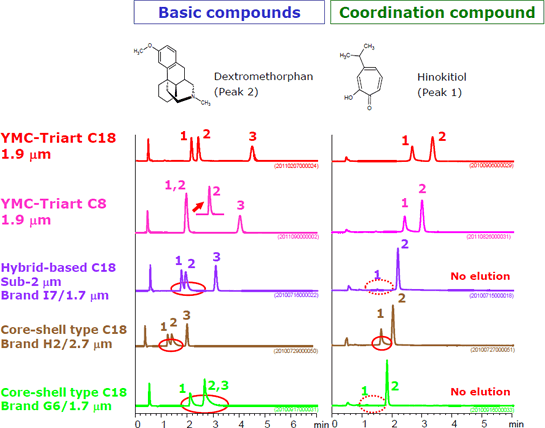
| Basic compounds | |
| Column | 50 X 2.0 mmI.D. or 50 X 2.1 mmI.D. |
|---|---|
| Eluent | 20 mM KH2PO4-K2HPO4 (pH 6.9)/acetonitrile (65/35) |
| Flow rate | 0.2 mL/min |
| Temperature | 40℃ |
| Detection | UV at 235 nm |
| Sample | 1. Chlorpheniramine 2. Dextromethorphan 3. Propyl paraben (I.S.) |
| Coordination compound | |
| Column | 50 X 2.0 mmI.D. or 50 X 2.1 mmI.D. |
|---|---|
| Eluent | acetonitrile/0.1% H3PO4 (40/60) |
| Flow rate | 0.2 mL/min |
| Temperature | 40℃ |
| Detection | UV at 254 nm |
| Sample | 1. Hinokitiol 2. Methyl benzoate (I.S.) |

